高考英语形容词和代词的用法
- 格式:pdf
- 大小:1.19 MB
- 文档页数:8
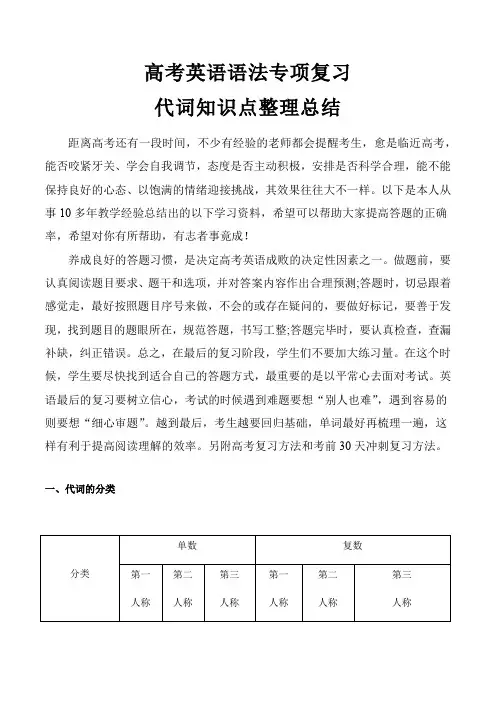
高考英语语法专项复习代词知识点整理总结距离高考还有一段时间,不少有经验的老师都会提醒考生,愈是临近高考,能否咬紧牙关、学会自我调节,态度是否主动积极,安排是否科学合理,能不能保持良好的心态、以饱满的情绪迎接挑战,其效果往往大不一样。
以下是本人从事10多年教学经验总结出的以下学习资料,希望可以帮助大家提高答题的正确率,希望对你有所帮助,有志者事竟成!养成良好的答题习惯,是决定高考英语成败的决定性因素之一。
做题前,要认真阅读题目要求、题干和选项,并对答案内容作出合理预测;答题时,切忌跟着感觉走,最好按照题目序号来做,不会的或存在疑问的,要做好标记,要善于发现,找到题目的题眼所在,规范答题,书写工整;答题完毕时,要认真检查,查漏补缺,纠正错误。
总之,在最后的复习阶段,学生们不要加大练习量。
在这个时候,学生要尽快找到适合自己的答题方式,最重要的是以平常心去面对考试。
英语最后的复习要树立信心,考试的时候遇到难题要想“别人也难”,遇到容易的则要想“细心审题”。
越到最后,考生越要回归基础,单词最好再梳理一遍,这样有利于提高阅读理解的效率。
另附高考复习方法和考前30天冲刺复习方法。
一、代词的分类二、代词的用法考点一it, that, one(s), those的用法1.it代替的是前面提到的同一事物,即同名同物,所代替的名词可以是可数名词,也可以是不可数名词。
如:I’d like to look at that atlas. May I borrow it?我想看看那张地图,我能借用一下吗(it代替可数名词atlas)?2.one叫作泛指代词代替的是前面提到的同名异物中的任何一个,所代替名词是可数名词单数,其前可带冠词与修饰语。
如果代替复数名词,则用ones。
如:①The population problem may be the greatest one in the world today.人口问题可能是当今世界上最大的一个问题。
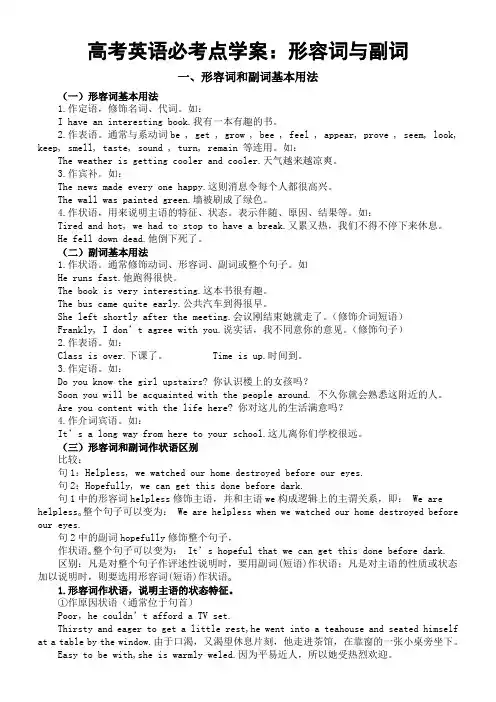
高考英语必考点学案:形容词与副词一、形容词和副词基本用法(一)形容词基本用法1.作定语,修饰名词、代词。
如:I have an interesting book.我有一本有趣的书。
2.作表语。
通常与系动词be , get , grow , bee , feel , appear, prove , seem, look, keep, smell, taste, sound , turn, remain 等连用。
如:The weather is getting cooler and cooler.天气越来越凉爽。
3.作宾补。
如:The news made every one happy.这则消息令每个人都很高兴。
The wall was painted green.墙被刷成了绿色。
4.作状语,用来说明主语的特征、状态。
表示伴随、原因、结果等。
如:Tired and hot, we had to stop to have a break.又累又热,我们不得不停下来休息。
He fell down dead.他倒下死了。
(二)副词基本用法1.作状语。
通常修饰动词、形容词、副词或整个句子。
如He runs fast.他跑得很快。
The book is very interesting.这本书很有趣。
The bus came quite early.公共汽车到得很早。
She left shortly after the meeting.会议刚结束她就走了。
(修饰介词短语)Frankly, I don’t agree with you.说实话,我不同意你的意见。
(修饰句子)2.作表语。
如:Class is over.下课了。
Time is up.时间到。
3.作定语。
如:Do you know the girl upstairs? 你认识楼上的女孩吗?Soon you will be acquainted with the people around. 不久你就会熟悉这附近的人。
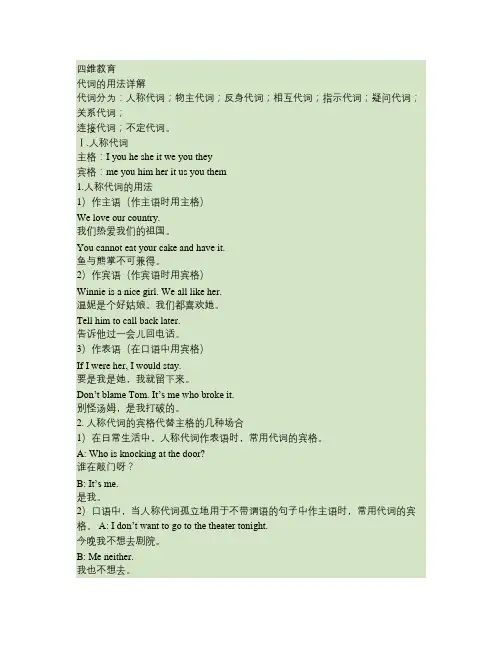
四维教育代词的用法详解代词分为:人称代词;物主代词;反身代词;相互代词;指示代词;疑问代词;关系代词;连接代词;不定代词。
Ⅰ.人称代词主格:I you he she it we you they宾格:me you him her it us you them1.人称代词的用法1)作主语(作主语时用主格)We love our country.我们热爱我们的祖国。
You cannot eat your cake and have it.鱼与熊掌不可兼得。
2)作宾语(作宾语时用宾格)Winnie is a nice girl. We all like her.温妮是个好姑娘。
我们都喜欢她。
Tell him to call back later.告诉他过一会儿回电话。
3)作表语(在口语中用宾格)If I were her, I would stay.要是我是她,我就留下来。
Don’t blame Tom. It’s me who broke it.别怪汤姆,是我打破的。
2. 人称代词的宾格代替主格的几种场合1)在日常生活中,人称代词作表语时,常用代词的宾格。
A: Who is knocking at the door?谁在敲门呀?B: It’s me.是我。
2)口语中,当人称代词孤立地用于不带谓语的句子中作主语时,常用代词的宾格。
A: I don’t want to go to the theater tonight.今晚我不想去剧院。
B: Me neither.我也不想去。
A: I’d like to stay here for another week.我想在这里再呆一周。
B: Me too.我也是。
3)在带as 和than 的比较级后面,许多场合下用代词的宾格。
She knows me as well as him.她像了解他一样了解我。
He is taller than me.他比我高。
4)口语中,当人称代词用于带有强烈感情色彩的句子中作主语且其后不带宾语时,多用代词的宾格。
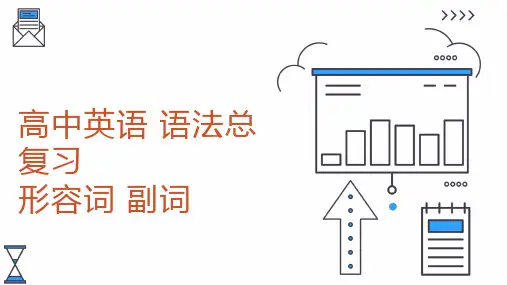

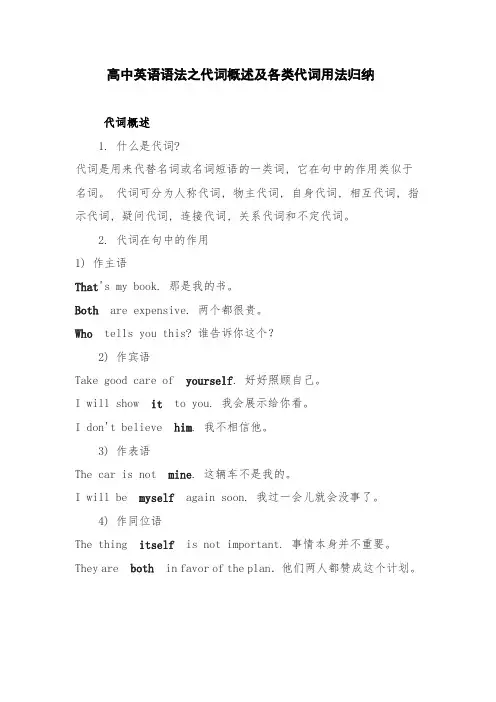
高中英语语法之代词概述及各类代词用法归纳代词概述1. 什么是代词?代词是用来代替名词或名词短语的一类词, 它在句中的作用类似于名词。
代词可分为人称代词, 物主代词, 自身代词, 相互代词, 指示代词, 疑问代词, 连接代词, 关系代词和不定代词。
2. 代词在句中的作用1) 作主语That's my book. 那是我的书。
Both are expensive. 两个都很贵。
Who tells you this? 谁告诉你这个?2) 作宾语Take good care of yourself. 好好照顾自己。
I will show it to you. 我会展示给你看。
I don't believe him. 我不相信他。
3) 作表语The car is not mine. 这辆车不是我的。
I will be myself again soon. 我过一会儿就会没事了。
4) 作同位语The thing itself is not important. 事情本身并不重要。
They are both in favor of the plan.他们两人都赞成这个计划。
5) 作呼语You stand here and wait for the bus. 你站在这儿等公车吧。
Be patient, everyone. 大家都耐心点吧。
6) 作定语That's my glasses. 那是我的眼镜。
I'll buy that umbrella.人称代词1. 人称代词的词汇a) 人称代词主格 (在句中作主语)单数第一人称: I (我)单数第二人称: you (你)单数第三人称: he, she, it (他,她,它)复数第一人称: we(我们)复数第二人称: you(你们)复数第三人称: they (他们/她们/它们)b) 人称代词宾格 (在句中作宾语)单数第一人称: me (我)单数第二人称: you (你)单数第三人称: him, her, it(他,她,它)复数第一人称: us(我们)复数第二人称: you(你们)复数第三人称: them (他们/她们/它们)2. 人称代词在句中的作用1) 作主语I am a student. 我是一名学生。
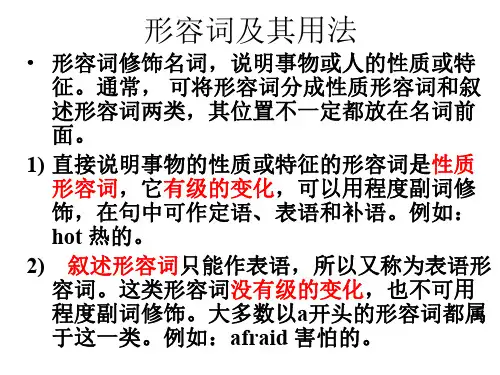
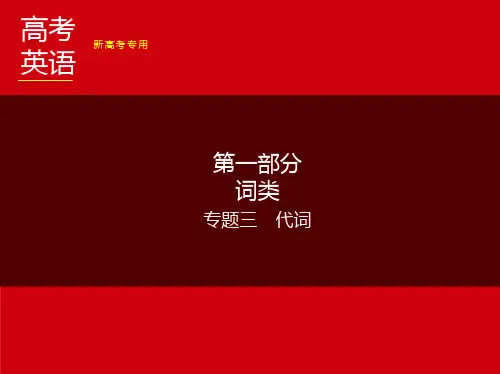
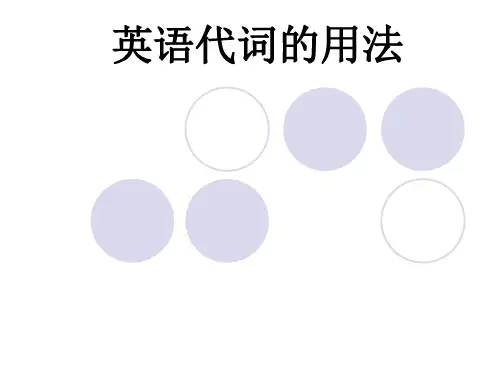

在英语学习中,很多同学分不清楚什么是代词、名词,还是形容词,也不太清楚这些词该如何用,导致考试的时候,随便选一个,对错只能靠运气了,这样势必会影响成绩。
其实,英语中的这些词性,看似很容易弄混,但也有规律可循,距离高考还有二十几天的时间,小天对英语词性分类与用法进行了梳理,帮助同学们掌握词性的同时,提升英语语法填空成绩与能力。
1. 名词名词是指代人、物、事、时、地、情感、概念等实体或抽象事物的词。
名词可以分为专有名词(Proper Nouns)和普通名词 (Common Nouns),专有名词是某个(些)人、地方、机构等专有的名称,如Beijing,China等;普通名词是一类人或东西或是一个抽象概念的名词,如:book,sadness等。
小天提示:名词有时可以单独作为一个句子。
名词,还有可数名词、不可数名词的区别,同学们在学习中要注意。
(两者之间的用法可以参考之前的推文)2. 代词英语中的代词按其意义、特征及在句中的作用通常分为:人称代词、物主代词、指示代词、反身代词、疑问代词、关系代词和不定代词等。
1)人称代词有主格和宾格之分:主格有I, you, he, she, it, we, they等,宾格有me, you, him, her, it, us, you, them等。
2)物主代词有形容词性和名词性两种:形容词性物主代词my, your, his,her等,名词性物主代词mine, yours, his, hers等。
3) 反身代词:myself, yourself, himself, herself, ourselves,等。
4)指示代词:this, that, these, those等。
5)疑问代词:what, which, who, whom, whose等。
6)不定代词:some,any, something, somebody等。
7)关系代词: that, who, whom, whose, which, as 等。
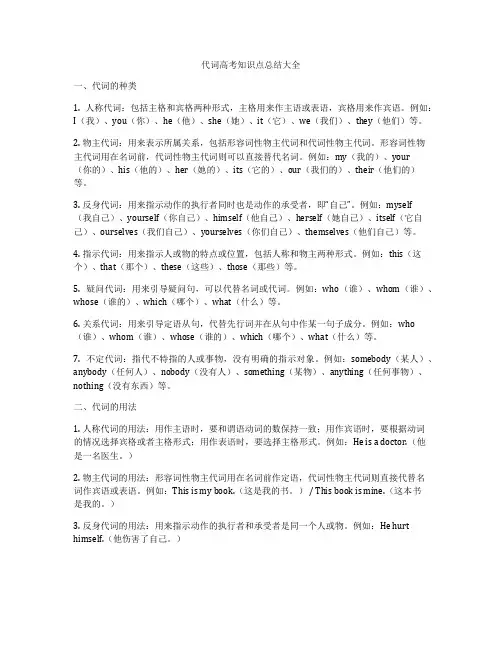
代词高考知识点总结大全一、代词的种类1. 人称代词:包括主格和宾格两种形式,主格用来作主语或表语,宾格用来作宾语。
例如:I(我)、you(你)、he(他)、she(她)、it(它)、we(我们)、they(他们)等。
2. 物主代词:用来表示所属关系,包括形容词性物主代词和代词性物主代词。
形容词性物主代词用在名词前,代词性物主代词则可以直接替代名词。
例如:my(我的)、your(你的)、his(他的)、her(她的)、its(它的)、our(我们的)、their(他们的)等。
3. 反身代词:用来指示动作的执行者同时也是动作的承受者,即“自己”。
例如:myself(我自己)、yourself(你自己)、himself(他自己)、herself(她自己)、itself(它自己)、ourselves(我们自己)、yourselves(你们自己)、themselves(他们自己)等。
4. 指示代词:用来指示人或物的特点或位置,包括人称和物主两种形式。
例如:this(这个)、that(那个)、these(这些)、those(那些)等。
5. 疑问代词:用来引导疑问句,可以代替名词或代词。
例如:who(谁)、whom(谁)、whose(谁的)、which(哪个)、what(什么)等。
6. 关系代词:用来引导定语从句,代替先行词并在从句中作某一句子成分。
例如:who (谁)、whom(谁)、whose(谁的)、which(哪个)、what(什么)等。
7. 不定代词:指代不特指的人或事物,没有明确的指示对象。
例如:somebody(某人)、anybody(任何人)、nobody(没有人)、something(某物)、anything(任何事物)、nothing(没有东西)等。
二、代词的用法1. 人称代词的用法:用作主语时,要和谓语动词的数保持一致;用作宾语时,要根据动词的情况选择宾格或者主格形式;用作表语时,要选择主格形式。
高中英语语法专题形容词与必背短语高中英语语法专题形容词一、概念说明人或者事物的特征、性质或状态,常用来修饰名词或不定代词的词叫做形容词。
二、形容词在句子中的成分形容词在句子中通常可以做定语、表语、宾语补足语。
1. 形容词做定语(修饰名词或者代词)例如:The lovely hat is mine. 这个可爱的帽子是我的。
I have something important to tell you. 我有重要的事情要告诉你。
2. 形容词做表语,组成主系表结构例如:She looks young. 她看上去很年轻。
3. 形容词作宾语补足语例如:Lucy wants to make herself beautiful. Lucy想让自己变得漂亮。
三、形容词的原级、比较级、最高级1 形容词原级①与形容词原级连用的副词有:very、so、too、enough、quite等。
例如:It’s too cold to g o outside. 外面太冷了,不适合出去。
②形容词原级比较的固定搭配:肯定:A...+as+形容词原级 +as+B例如:Lucy is as clever as Jack. Lucy和Jack一样聪明。
否定:A...+not+as/so+形容词原级+as+B例如:Lucy is not as/so clever as Jack. Lucy不如Jack聪明。
表示倍数:A...+倍数+as+形容词原级+as+B例如:My room is half as big as yours. 我的房间是你房间的一半大。
My room is three times as big as yours. 我的房间是你的三倍大。
2 形容词比较级(两者比较)(1) 固定结构:A...+比较级+than+B例如:Lucy’s room is bigger than yours. Lily的房间比你的大。
The weather of Qingdao is colder than that of Zhejiang in winter. (为避免重复that表示前面提到的weather.) 冬天青岛的天气比浙江冷。
完整版)英语中代词的用法代词的用法代词是用来代替名词或句子的词语。
根据其意义和用法,代词可分为九类:人称代词、物主代词、反身代词、指示代词、相互代词、疑问代词、连接代词、关系代词和不定代词。
在这九类代词中,不定代词一直是高考英语的重点。
人称代词包括I、you、she和him。
疑问代词包括who、whom、whose、which和what,它们用于引导特殊疑问句。
需要注意的是,what和which的用法区别在于,当选择的范围较明确时,用which;不明确时用what。
例如,Which colordo you like。
red。
black or white。
What color is your car?物主代词包括my、your和hers。
关系代词包括which、that、who和whom。
反身代词包括myself和yourselves,用于be、feel、seem、look等动词后作表语,表示身体或精神所处的状态。
例如,I'll be myself again in no time.我一会儿就会好的。
He doesn't feel himself today。
I’m not quite my self these days.我近来身体不大舒服。
连接代词包括who、whom、what、which、whose、___、___和whichever,主要用于引导主语从句、宾语从句和表语从句等。
相互代词包括each other和one another。
不定代词包括one、each、another和neither。
指示代词包括this、that、those 和these。
需要注意的是,为避免重复,可用that和those代替前面提到的名词。
例如,The playground of this school is bigger than that of that school。
(that=the playground) My books are next to those of the monitor.As a subject。
高考英语语法复习
形容词与副词知识讲解
一、形容词的用法
被形容词修饰的名词若还有其他词修饰,如冠词、指示代词、形容词性物主代词等,这些词要置于形容词前。
名词前的多个修饰语可用
“限定描绘大长高,
形状年龄和新老,
颜色国籍出材料,
作用类别往后靠”
来记忆。
二、易用错的几类形容词
三、形容词的比较等级
English is as interesting a subject as Chinese.
Which is the better of the two watches?
She is the taller of the two girls.
other或else把主语排除在比较对象之外;但如果不在同一范围比较则不需要用。
Susan is taller than any girl in her sister’s class.
四、副词的句法功能
五、副词的位置
六、副词比较等级的用法。
高考英语形容词与副词一、形容词01 形容词的句法功能02 形容词的位置形容词作定语时一般置于被修饰词前作前置定语,下列情况中形容词通常后置于被修饰词。
(1)修饰something,anybody,nobody,anything等复合不定代词时There is nothing wrong with the machine.(机器什么问题都没有。
)(2)形容词词组作定语时She bought a book suitable for children.(她买了本适合孩子们的图书。
)(3)修饰表示数量的词要后置The baby is only five months old.(这个婴儿仅有五个月大。
)(4)enough作形容词修饰名词时,一般放在名词之前,也可放在名词之后We don't bring enough money.(我们没带够钱。
)There‘ll be time enough to relax when you’ve finished your work.(你完成工作后会有足够的时间来放松。
)[注]形容词常见于定语位置和表语位置,以上只列出几种常见情况讲解。
具体位置要视具体形容词及句子而定。
03 多个形容词修饰名词时的语序按以下顺序排列:(1)限定词(a/an,the,this,his,first,one...)(2)表示特征或性质等描述性形容词(good,pretty...)(3)表示大小、长短、高低的形容词(big,long,little...)(4)表示形状的形容词(round,square...)(5)表示年龄、新旧的形容词(old,young,new...)(6)表示颜色的形容词(red,yellow...)(7)表示国籍、地区、出处的形容词(America,southern,Italian...)(8)表示物质材料的形容词(wooden,woollen,glass...)(9)表示用途、类别的形容词(medical,writing...)a beautiful large green Chinese carpet一块漂亮宽大的绿色的中国地毯the first three days 头三天enormous black iron gates 巨大的黑色铁门04 形容词的特殊用法二、副词01 副词的种类根据词义可分为:(1)时间副词yesterday(昨天),today(今天),now(现在)等。
代词高考对代词的考查主要是人称代词、物主代词、反身代词、指示代词、不定代词、疑问代词和关系代词等;设置特定的语境,对代词的数、性、格的变化进行考查仍然是高考的热点;Ⅰ代词的分类1.人称代词:主格I, we, you, he, she, it, they宾格me, us, you, him, her, it, them2.物主代词:形容词性my, our, your, his, her, its, their名词性mine, ours, yours, his, hers, its, theirs3.反身代词:单数myself, yourself, himself, herself, itself复数ourselves, yourselves, themselves4.相互代词:each other 两者之间相互;one another 两者以上的相互5.指示代词:this, that, these, those6.疑问代词:who, whom, whose, which, what7.关系代词:who, whom, whose, that指人,which, that, as, whose 指物8.不定代词:all, each, either, neither, both, none, other, another, something, everything, nothing somebody, everybody, nobody someone, everyone, no one, many, much, few, less一、人称代词单数复数第一人称第二人称第三人称第一人称第二人称第三人称人主I you he,she,itwe you they称代词格宾格me you him,her,itus you them人称代词的用法1.人称代词的主格在句子中作主语或主语补足语;如:John waited a while but eventually he went home.约翰等了一会儿,最后他回家了; John hoped the passenger would be Mary and indeed it was she.说明:在复合句中,如果主句和从句主语相同,代词主语要用在从句中,名词主语用在主句中;When he arrived,John went straight to the bank.约翰一到就直接去银行了;2.人称代词的宾格在句子中作宾语或介词宾语,但在口语中也能作主语补语,第一人称在省略句中,还可以作主语;如:I saw her with them;at least,I thought it was her.第一个her作动词宾语,them作介词宾语,第二个her作表语—Who broke the vase谁打碎了花瓶—Me.我;3.人称代词之主、宾格的替换1宾格代替主格在简短对话中,当人称代词单独使用或在not 后,多用宾语;—I like English.;—Me too.—Have more wine—Not me.;在表示比较的非正式的文体中,常用宾格代替主格; 但如果比较状语的谓语保留,则主语只能用主格;He is taller than I/me. He is taller than I am.2主格代替宾格在介词but,except后,有时可用主格代替宾格;在电话用语中常用主格;—I wish to speak to Mary.;—This is she.注意:在动词be 或to be后的人称代词视其前面的名词或代词而定;I thought it was she.我以为是她;主格——主格I thought it to be her.宾格——宾格I was taken to be she.我被当成了她;主格——主格They took me to be her.他们把我当成了她;宾格——宾格4.代词的指代问题1不定代词anybody,everybody,nobody,anyone, someone, everyone,no one, 及whoever和person在正式场合使用时,可用he,his,him代替;如:Nobody came,did he2动物名词的指代一般用it或they代替,有时也用he,she,带有亲切的感情色彩;如:Give the cat some is hungry.;3指代车或国家,船舶的名词,含感情色彩时常用she;5.并列人称代词的排列顺序1单数人称代词并列作主语时,其顺序为:第二人称→ 第三人称→第一人称,即you→ he/she; it → I;如:You,he and I should return on time.你,他还有我应该按时回来;2复数人称代词作主语时,其顺序为:第一人称→ 第二人称→第三人称,即we→you→they;在下列情况中,第一人称放在前面;在承认错误,承担责任时;It was I and John that made her angry.是我和约翰惹她生气了;在长辈对晚辈,长官对下属说话时,如长官为第一人称,如:I and you try to finish it.并列主语只有第一人称和第三人称时;当其他人称代词或名词被定语从句修饰时;二、物主代词物主代词是表示所有关系的代词,也可叫做代词所有格;物主代词分形容性物主代词和名词性物主代词两种,其人称和数的变化见下表;单数复数第一人称第二人称第三人称第一人称第二人称第三人称物主代词形容词性my your his,her,its our your their名词性mine your shis,hers,its ours yours theirsOur school is here,and theirs is there.我们的学校在这儿,他们的在那儿;1.物主代词的用法1物主代词既有表示所属的作用又有指代作用;如:John had cut his finger; apparently there was a broken glass on his desk.2物主代词有形容词性my,your等和名词性mine,yours等两种,形容词性的物主代词属于限定词;名词性的物主代词在用法上相当于省略了中心名词的’s属格结构;如:Jack’s cap意为The cap is Jack’s;His cap意为The cap is his;2.名词性物主代词的句法功能1作主语;如:May I use your pen Yours works better.2作宾语;如:I love my motherland as much as you love yours.3作介词宾语;如:You should interpret what I said in my sense of the word,not inyours.4作表语;如:The life I have is ’s ’s yours.3.双重所有格物主代词不可与a,an,this,that,these,those,some,any,several,no,each,every,such,another,which等词一起前置,修饰一个名词,而必须用双重所有格;公式为:a,an,this,that+名词+of+名词性物主代词;三、指示代词指示代词表示“那个”“这个”“这些”“那些”等指示概念的代词;指示代词有this,that,these,those等;如:That is a good idea.指示代词的用法1.指示代词分单数this/that和复数these/those两种形式,既可作限定词又可作代词;2.指示代词的句法功能;1作主语;如:This is the way to do it.2作宾语;如:I like this better than that.3作表语;如:My point is this.4作介词宾语;如:I don’t say no to that.There is no fear of that.说明1:指示代词在作主语时可指物也可指人,但作其他句子成分时只能指物,不能指人;如:对That is my teacher.那是我的老师;that作主语,指人对He is going to marry this girl.他要和这个姑娘结婚;this作限定词错He is going to marry this.this作宾语时不能指人对I bought this.我买这个;this指物,可作宾语说明2:that和those可作定语从句的先行词,但this和these不能,同时,在作先行词时,只有those可指人,试比较:对He admired that which looked beautiful.对He admired those who looked beautiful.他赞赏那些外表漂亮的人;those 指人错He admired that who danced well.that 作宾语时不能指人对He admired those who danced well.他赞赏跳舞好的人;those 指人对He admired those which looked beautiful.他赞赏那些外表漂亮的东西;those指物四、反身代词表示“我自己”“你自己”“他自己”“我们自己”“你们自己”和“他们自己”等的代词,叫做自身代词,也称为“反身代词”;如:She was talking to herself.她自言自语;反身代词单数复数第一人称第二人称第三人称第一人称第二人称第三人称myself yourself himselfherselfitselfourselves yourselves themselves反身代词的用法1.作宾语,如1有些动词需有反身代词,如absent,bathe,amuse,blame,dry,cut,enjoy,hurt,introduce,behave等;如:We enjoyed ourselves very much last night.Please help yourself to some fish.2用于及物动词+宾语+介词,如:take pride in,be annoyed with,help oneself to sth 等;I could not dressmyselfup at that time.注:有些动词后不跟反身代词,如:get up,stand up,wake up等;Please sit down.2.用作表语;如;I am not myself today.3.用作同位语;如The thing itself is not important.4.在不强调的情况下,but,except,for 等介词后宾语用反身代词或人称代词宾格均可;注意:1反身代词本身不能单独作主语;错Myself drove the car.对I myself drove the car.我自己开车;2但在and,or,nor连接的并列主语中,第二个主语可用反身代词,特别是myself 作主语;Charles and myself saw it.查尔斯和我看见了这件事;五、相互代词表示相互关系的代词叫相互代词,有each other和one another两个词组;他们表示句中动词所叙述的动作或感觉在涉及的各个对象之间是相互存在的;如:It is easy to see that the people of different cultures have always copied each other.,相互借鉴的相互代词宾格each other,one another所有格each other’s,one another’s相互代词的句法功能1.作动词宾语;如:People should love one another.人们应当彼此相爱;2.可作介词宾语;Dogs bark,cocks crow,frogs croak to each other.犬吠、鸡鸣、蛙儿对唱;说明:传统语法认为,相互关系存在于两个人或物之间用each other, 存在于两个以上人和物之间用one another;现代英语中,两组词交替使用的实例也很多;He put all the books beside each other/one another.他把所有书并列摆放起来; Usually these small groups were independent of each other.这些小团体通常是相互独立的;3.相互代词可加’s构成所有格;如:The students borrowed each other’s notes.六、不定代词不是指明代替任何特定名词的代词叫做不定代词;常见的不定代词有all,both,each,every等,以及含有some,any,no等的合成代词,如anybody,something,no one;这些不定代词大都可以代替名词和形容词,在句中作主语、宾语、表语和定语,但none和由some,any,no等构成的复合不定代词只能作主语、宾语或表语;every 和no只能作定语;如:—Do you have a car— Yes,I have one.—I don’t know any of them.他们,Ⅱ代词的用法1. nothing, none, no onenone作为代词,最常用来表示数量,它可以是一个可数的概念how many也可以是一个不可数的概念how much,或者any引起的问题;而nothing是相对于something有某物什么都没有,它回答的是“What is in/on...”的问题;而no one=nobody没有人,它回答的是“Who did that”谁……或是anyone有没有人的问题;2. one, ones, that, those, it1one和ones可以用来代替前面提到过的可数名词,one代单数,ones代复数,其中:两者都可以指代物只要是可数one前面一般不加a,因为它本身有“一个”的意思,但如果one前面有形容词修饰,则需要加a/an;one可以单独使用,意思为“任何人”;例如:—Shall we have a rest—Didn’t we just have one因为one=a somethingOne should always believe in oneself.2that与those:that可以代替前面提到的不可数名词或可数名词单数相当于the one;而those 代替前面提到的复数名词,有时可以用the ones替换;例如:The population of China is bigger than that of India. that=the populationThe boy told his story and that of the girl next room.that=the storyThe cell phones we made nowadays are better than those/the ones made 2 years ago.those=the cell phones=the ones3one和it:两者都可以用来代替前面出现过的单数名词,one指这类东西中的任何一个,指类属,泛指;it指前面所指的同一物;例如:I need a pen to sign my name. Can I have one one =a pen I cannot find my new pen. Have you seen itit指那支新钢笔3. another, the other, other, others, the others1another和the other:两者都是“另一个”的意思,但数量上有区别:用another指两个以上的数量,而the other只指两个中的另一个,例如:He has three brothers, one is a teacher, another is a doctor and the third is an engineer.注:another除了可以作代词,还可以用作形容词;这里有必要区别another, the other和more的用法:①another:another表“另一个”时只跟可数名词单数,而表“另外的、额外的、附加的”时,可跟带有few或具体数字的复数名词,此时可把“数词+复数名词”看作是一个整体;例如:—Have you finished your report yet—No,I will finish it in another 10 minutes.There is room for another few people in the back of the bus.②other:表“另外的”接复数名词,如与具体数词连用,则置于数词之后,但与定冠词the连用时,other要放在数词前;例如:Tony is going camping with two other little boys next Sunday.Do you know where he found the other two photos③more:more一般位于数词之后,名词之前,有时也可置于名词之后;例如:One more stepOne step more,and I’ll shoot you.Where shall we be in ten more yearsmore除跟数词外,还可与many, a little,a few,a lot,several等词连用,例如:There are many more dictionaries on the desk.Would you like some more tea2 others, the othersothers是相对于some来说的:some...some....others... 一些……一些……另一些……是泛指;而the others是特指另一些,相对于ones 可以理解为one, the other 的复数;例如:Class 1 are cleaning the classroom. Some are sweeping the floor, some are cleaning the window, and others are washing the blackboard. 泛指There are only 20 students in the classroom, where are the others.特指4. both, other, neither, each, any, allboth:两者都,谓语动词用复数;either:两者中间的任何一个,谓语动词用单数;neither:两者中间无任何一个,谓语动词多用单数,也可以用复数;each:两个或两个以上中的每一个,谓语动词用单数;any:三者或三者以上中的任何一个,谓语动词用单数;all:三者或三者以上全部;5. some, any, nosome属于肯定词,主要用于肯定句中,但当说话人期待肯定回答时,也可以用于疑问句中;例如:Could I have some more tea, please Would you like some more coffeeany属于非肯定词,主要用于否定句、疑问句或条件句中;它可以与形容词的比较级连用;例如:Don’t come any closer,or I’ll shootno属于否定词,用于否定句中:no+可数名词单数=not a/an no+可数名词复数=not any;例如:There is no such thing as a free lunch in the world.考点诠释纵观历年高考试题,代词的主要考点主要集中在以下几个方面:不定代词one,the one,ones,the ones;物主代词的用法;人称代词主格和宾格的用法;表示两者和多者的不定代词的比较;指示代词this,that,these,those,it的用法;another,theothers,else;the rest的用法;every-,some-,any-,no-与-thing,-one,-body构成的复合不定代词的用法;考点1 人称代词一般地说人称代词作主语时用主格;作宾语时用宾格;作定语时用形容词性物主代词;名词性物主代词可以代替“形容词性物主代词+名词”;但口语中,在无动词的句子里,往往用代词的宾格形式;1.用于无谓语的句子中一Dpes any of you know why Jack hasn’t come yet一Me.;答语如果带谓语,就得用主格,如:I can.和I do,too./So do I.2.表示惊奇、猜疑、反问、不满、厌烦等①Do you have good eyesight,young man一MeI can see a sparrow two hundred paces away.②WhatMe fight a big chap like himNot me3.代替as,than等连词之后的主格多用于口语中,尤其用于句末①I’m not as tall as himhe.;②She is much more careful than meI.她比我细心得多;当这类人称代词带有all,both等同位语时,用宾格的形式就更为常见了;如:He works harder than us a11.典例:Our neighbers gave a baby bird yesterday that hurt when it fell from its nest. A.us;it B.us;itself C.ourselves;itself D.ourselves;it考点2指不代词1.this/these,that/thosethis,these指代下面要说的内容;that,those指代上面陈述过的内容;如:①What I’d like to say about how to improve our spoken English is like this.②That’s a11.Thank you.③Salaries are higher here than those inmy hometown.2.一些习惯说法中this和that的用法比较固定①Who’s that你是谁②This is Mary.③11at’s all right/OK.;对感谢的答语④nat’S nothing.;对道歉的答语‘⑤That’s that.表示决定不能更改⑥That’S a11.就这些了;⑦That is…那就是……3.this,that有时可以用作副词,意为“这么,那么”,用在形容词或副词前作状语,表示程度It isn’t that cold.还没那么冷;考点3不定代词以下是几组易混不定代词:1.some类不定代词与any类不定代词1some类不定代词多用于肯定句中;any类的多用于疑问句、否定句和条件状语从句中;如:Raise your hands if you have any questions.如果你们有问题,请举手;2但在表示客气的请求或希望对方给予肯定回答的疑问句中,要用some类的不定代词;如:Would you like something to drink你要喝点什么吗3any类的不定代词用在肯定句中,表示“任何一个;任何事情;无论什么”;如:She promised that she could do anything for you.她许诺能为你做任何事情;2.all,both,neither,none1all指三者或三者以上“都”,both指两者“都”;如:①Bothofhis hands were wounded.②Allofhis fingers were wounded.2neither表示“两个都不”,常和of连用,放在带有冠词、物主代词或指示代词的复数名词之前,作主语时,谓语动词可以用单数或复数;none表示三个或三个以上“都不”,可用于人,也可用于物,后可接of短语,与复数名词、代词或单数集合名词连用作主语,指人时,谓语动词用单、复数皆可;指物时,只用第三人称单数形式;如:①Neither of the twins is/are cor rect.②None of us has/have ever been to the Great wall.3.any,either,each,every1any一般用于否定句、疑问句和条件句中;也可用在肯定句中,以加强语气,表示“任一”的概念;还可以用来修饰可数名词单数,表示三者或三者以上中的“任何一个”;如:I didn’t eat any meat.我一点儿肉也没吃;4.no,none,nothing,nobody1no不能单独使用,相当于not a或not any,作定语修饰可数名词或不可数名词;如:You have no sympathy for the sufferings of others.你对别人的痛苦没有同情心;2none既可以指人,也可以指物,侧重指三者或三者以上的人或物,用于回答how many/much引导的疑问句,可与介词of连用;如:①None of the books is suitable for the young.这些书都不适合年轻人读;②一How many people are there in the room一None.没人;3nobody指人,用于回答who引导的疑问句;nothing指物,用于回答what引导的疑问句;如:一Who is in the room谁在屋内一Nobody.没有人;5.it,one,ones, that和those1it特指上文所提到的同一个物,它所代替的名词常由the,this,that等修饰;one指上文提到的同类事物中的一个,不特指,被指代的名词通常由不定代词some或any修饰;如:①Where is that bookI can’t find it.那本书在哪儿我找不到它;②I haven’t got any erasers.Will you please give me one我没有橡皮,请你给我一块好吗(2)one与that都可用来代替上文中出现的名词,one前要用定冠词the,有时that和the one可互换使用;如:The book isn’t so interesting as the one/that you borrowed.3但that和one在多数情况下是不能互换的,主要区别在于:that既可代替可数名词,也可代替不可数名词,常要求有后置定语,一般不指人,复数形式为those;one只能代替可数名词单数,复数形式为ones;当可数名词前有形容词修饰时,只能用one,不用that;当of短语作可数名词的后置定语时,用that,不用one;如:①The best cigarettes are those from Yunnan.②The boy told me his story and that of the girl next door.Your coat is blue,and my new one is green.你的大衣是蓝色的,我的新大衣是绿色的;4the ones用来代替上文提到的特指的复数名词,有时可以用those代替,尤其在有后置定语的情况下;如:The books on the desk are better than those/the ones under the desk.6.another,other,others,more1another既可以单独使用,也可以用于单数名词前,泛指三者或三者以上中的“另外一个人或物”;还可以用“another+数量词+复数名词”,表示”再,又”;如:①was there another way out②we’d better wait another five minutes.特别提示表示“另外一个学生”只能用another student,不能说成another one student;2other不能单独使用,应用于复数名词前,表示另外的某些人或物,也可以用在some,any,no之后,或具体数词之后,再接名词,构成”不定代词或具体数词+other+名词”;接单数名词时,还可以用在冠词the后,特指两个人或物中的另外一个可以省略为the other,或特指另外的某些人或物可以省略为theothers,others泛指”其他的事物,别人”;如:Done remained and the other went away.②We should learn to treat others as equals.7.something,anything,everything,nothing1something一般用在肯定句中,也可以用在表示邀请、征询意见的委婉问句中;如:Could you do something for me请为我做点事好吗(2)anything用在否定句、疑问句或条件句中;如:There isn’t anythinginside.3everything意为”一切事物”,可用在肯定句或疑问句中;用于否定句时,表示部分否定;表示全部否定时要用nothing或not anything;如:Everything is good when new,but friends when old.东西是新的好,朋友是老的亲;谚语4nothing表示”什么也没有”,常用于陈述句,表示否定意义,不能与否定词连用;如:①Do nothing by halves.凡事不可半途而废;谚语②Fools learn nothing from wise men,but wise men learn much from fools.愚者不学无术,智者不耻下问;谚语典例1:2010高考英语江西卷,27Swimming is my favorite sport. There is _______ like swimming as a means of keeping fit.A somethingB anythingC nothingD everything答案C解析考查不定代词;句意:游泳是我最爱的运动;再没有比游泳更好的锻炼方式了;There is nothing like…意即”没有什么能像……了”;典例2:2009陕西Jane was asked a lot of questions,but she didn’t answer of them.A.other B.any C.none D.some典例3:2009江苏Nine in ten parents said there were significantdifferences in their approach to educating their children compared with of their parents.A.those B.one C.both D.that解析D 句意:十分之九的家长认为他们教育孩子的方法和他们父母的教育方法有明显的差别;在同一句话中,指代的名词和前面提到的名词是同一类,即同名异物,要用that;考点4 反身代词1.反身代词在句中可以作宾语、表语、并列主语,以及名词、代词的同位语①The text itself is very easy.作主语的同位语②EitherJane or yourselfwill go there.;作并列主语,但不能单独作主语③He is not laughed at that laughs at himself first.谚自嘲者不会让人嘲笑; ④Respect yourseff,or noone else will respect you.谚要人尊敬,必须自重;2.主语与宾语是同一个人时,应当用反身代词teach oneself,enjoyoneself,help oneself,throw oneself,look after oneself3.在系动词后作表语,常用于否定句,表示身体不适I don’t know what’S the matter with me.I’m not myself today.4.用在交际英语中①Help yourseff②Make yourself at home③Don’t upset yourself5.辨别几组搭配by oneself独自for oneself独自地,靠自己的力量;of oneself~t动地;to oneself独占,典例:Isn’t it amazing how the human body heals after an injuryA.hireself B.him C.itself D.it考点5 it的用法在英语中,运用it的场合较多;从它在句中的作用和意义来看,it的用法可分为三类:1.指代作用1用作人称代词,代替前文或后文所提到的同一事物单数可数名词或不可数名词;如:Although we cannot see it,there is air all around us.(2)代替前面的整个句子;如:It is said that he has died of a disease,but it isn’t true.3用在答语中代替指示代词this,that;如:一What is this这是什么一It’s a bike.4代替不能或没有必要区分性别的或某些习惯说法中的人;如:①The baby cried because it Was hungry.婴儿哭是因为饿了;婴儿习惯上不区分性别②一Who is knocking at the door 一It’s me.5指环境、情形等;如:①I can’t stand it any longer.我再也不能容忍这种情况了;②Take it easy.别紧张;6指度量衡单位、时间、距离、季节、天气及自然现象;如:①It’s getting colder and colder now.现在越来越冷了;②It is winter now.现在是冬天了;2.形式作用1形式主语当动词不定式、形式或从句作主语时,通常把它们放在谓语之后,而用it作句子的形式主语;如:IIt’s no use crying over spilt milk.谚覆水难收;②It takes three generations to make a gentleman.谚十年树木,百年树人;2形式宾语当复合宾语中的宾语是不定式、v-ing形式或宾语从句时,往往把真正的宾语放在补足语后面,而用it作形式宾语,放在宾语补足语之前;如:①You must make it clear to them that the situation is serious.②They thought it difficult to talk to the guests about the recent events.特别提示形式宾语用在“主语+谓语动词+宾语”结构中,谓语动词appreciate,dislike,hate,like,love,make按时到达,成功等后接由if或when等引导的从句时,往往在从句前加形式宾语it;如:①1 would appreciate it if you paid in cash.如果你能支付现金的话,我会不胜感激;②The boy likes it when you do that.那个男孩喜欢你那样做;3.强调作用it可以用来改变句子的结构,使句子的某一成分得到强调;强调句型的基本结构为:It is/was+所强调的成分+that/who/whom+其他成分;高考链接1If our parents do everything for us children, we won't learn to dependonA. themselvesB. themC. usD. ourselves答案D主语为we,因此应为ourselves. depend on oneself:自力更生;2. 2010高考英语重庆卷,23He had lost his temper and his health in the warand never found of them again.B. eitherC. eachD. allA.neither答案 B;由his temper and his health可以排除CD,由后面的never表否定,选either,never/not either是全部否定,相当于neither;3. that’s import ant is that you are doing your best and moving inthe right direction.A.One B.All C.EverythingD.AnythingB此处All that's important相当于What's important,在主句中作主语,表示“重要的是……”4. 2010高考英语天津卷,6in my life impressed me so deeply as my first visitto the Palace Museum. A. Anything B. Nothing C.Everything D. Something5.2010高考英语四川卷,7On my desk is a photo that my father took ofwhen I was a baby. A. him B. his C. meD. mine答案Ctake a photo of sb意为给某人照相,此处应用人称代词的宾格;is said that two man-made structures are clearly visible from space. One is the Great Wall of China, and is Japans Kansai InternationalAirport.A.another B.other C.the other D.either 答案C;两者中的一个用one,两者中的另一个用the other,上句有提示twoman—made structures,所以用one…the other结构;7.The cost of renting a house in central Xi’an is higher than ____ in anyother area of the city. A. that B. this C. it D. one 答案A在西安市中心租一套房子的费用比在该市任何其他地区租一套房子的费用都要高;根据句意可知,空处指代The cost of renting a house,应该用that;8.Helping others is a habit, _______ you can learn even at an early age.A. itB. thatC. whatD. onefact that she was foreign made _____difficult for her to get a job in that country A so B. much C. that D. it 答案D题干中含有make it difficult for sb to do sth结构;形式宾语it代替后面的动词不定式短语to get a job in that country;is my favorite sport. There is _______ like swimming as a means of keeping fit.A somethingB anythingC nothing Deverything答案C句意:游泳是我最爱的运动;再没有比游泳更好的锻炼方式了;There is nothing like…意即”没有什么能像……了”;11When you introduce me to Mr. Johnson, could you please say for meA. everythingB. anythingC. somethingD. nothing答案 C;A项意为:“每件事”,B项意为“任何事”;C项意为“某事”;D项意为“没什么”;句意为:“当你把我介绍给约翰逊先生时,请为我说话吧;”something用在问剧中表示建议或请求,期望得到肯定或者所问问题可能性很大时;12.'ll spend half of my holiday practicing English and halflearning drawing.A. anotherB. the otherC. other’sD. other答案B句意:假期我会把一半时间用于练习英语,另一半用于学习绘画;half表示“一半”,the other half表示“另一半”;the other指两个事物中的“另一个”;13The doctor thought ____ would be good for you to have a holiday.A. thisB. thatC. oneD. it14.Neither side is prepared to talk to _____ unless we can smooth thingover between them;A. othersB. the otherC. anotherD. one other答案 B句意为:“双方都不准备和对方交流,除非我们能做一些调停的事情;”首先注意本句的Neither说明问题是出在两个对立方,而双方不打算作出让步,所以这里选B,the other指两者中的另一方;而another指的三者或三者以上;others 是针对两大类人的,常与some对应,没有one other的说法;15You are a team star Working with is rally your cup of tea.A. both B.either C. others D.the other答案:参考答案:1-5 ADAAB 6-10 CBAAC 11-15 BACCB 16-20 BBBDD 21-25 DCCCB 26-30 DCBAD 31-35 CCABA 36-40 ADBCB41-45 CCDBD 46-50 CADAC 51-53 CCB。